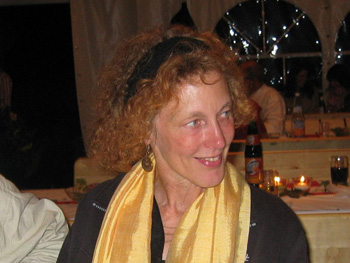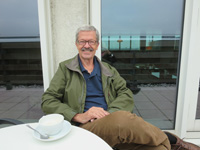Clearings, Iceholes, Other Abodes: Dorothea Grünzweig

Originally published as “Lichtungen, Eislöcher, andere Bleiben,” in Zwischen den Zeilen in April 2000, this thought-provoking “ars poetica”—truly “a jailbreak and recreation” (to reference Canada’s Margaret Avison)—is translated from the German by Derk Wynand.
Dorothea Grünzweig, born in Germany, has lived in Finland since 1989. She published a collection of selected poems, Sonnenorgeln, in 2011 and Geliebtes Kind der Sprache, her translations into German of, and commentary on, Gerard Manley Hopkins in 2009.
I
The way that jets, tempests, or fireworks, captured on paper by an adult child I know, get the fear of them off his back, arrest it—so do the words of poetry act as detention centres, repositories into which fear is thrust, to serve time there.
So if the adult child is distraught, one needs to recite poems to him, make up melodies in which they are wrapped and sing them. He sings along, grows calm, just as he grows calm after wild, erratic joy once the joyrousers slip into small shapes on the page, or laugh out and beckon from a poem.
When I think about poems, that’s the first thing which occurs to me: Writing, reciting them is a way to dispel anxiety. Freefloating anxiety is put in chains–that is, protectively–is temporarily housed in verbal abodes. The same could be said of grief, pain or giddy enthusiasm.
And when I think about poems, a hole appears in the winter lake’s ice. Diving into the icehole. With a despondent or overheated mind down into the water. Whatever works against stability is surrendered to it. It stays there, even as one rises to the surface oneself, tensed and light.
II
Nothing gets written
because it knows how to help
it’s only the poem a vision slit
through which clarity shines
to give us a firm new feel
for whatever weeps
where feeling verges on action.
With this poem another circle is described. A crack opens up in walls; planes are sliced open. A vision slit appears in an otherwise sealed surface. We cannot see to the other side, but light thrusts toward us; insight finds a brief abode within us: Blitzabode.
Writing, listening, we constantly need to keep forcing the vision slit open. Then the pain of thing, beast, and human lies there unshrouded, razorsharp. Recognized. The word, “weeping,” can also lead to Simone Weil’s assertion: “Every being cries out silently to be read differently.” Words themselves should be counted as such beings too.
Religious thought understands prayer, supplication, as a path to overcoming one’s own limitations by bowing down. Shortcomings are admitted, erased. Understands prayer as path to seeing with new eyes. Prayer and poem are spiritually akin.
The poem thinks of, thinks out, what was once called “thinking to the end.” It unburdens, because something is at once cast off and preserved. And lets something new appear.
Nothing palpable is changed, nothing visually averted or called up.
Here, mental frontiers must give way: writing that utterly engages us depends on the idea that the poem neighbours on a universal force field—by way of etymologies, verbal connections, sounds, movements, images mined up, interlaced languages, by way of listeners in an open field—and thus begins and continues to resonate with it in a subtle, unfathomable way.
With wishywashy words that flutter over things, the visual slit does not open. Things remain obscure, confused, remote. Only when a language that focuses all its powers on them is used does clarity arise, establishing genuine feeling, a being at one with things, creating a dialogue and contact with them.
Those words considered the best possible must be laid on things so they fit, so that half does not stick out beneath, so a huge gap does not lie between.
This laying on of words lets new verbal connections arise, seeks out the auditory passage of freely streaming sounds, adopts words of dialect, should the native inhabitants find themselves in their own linguistic terrain, helps words put on new faces and limbs, and allows many a word to become airylight in play, so that it changes its ways and no longer tries to strike dead. Or a verbal image clucks above an entire flock of things.
The result is a permanent search for the most fitting words.
Gerard Manley Hopkins is one of the poets who inspires this. Duns Scotus’ philosophy made him aware of the unique individuality of each and every thing. He wanted to live up to that, pursued it. Coined the concepts of “inscape,” “instress” (the first for the sensually perceptible appearance of things, the second for their inner force, their functioning.) Poetic language was to let this flare up, reveal it.
III
Finnish wordwoods—northern woods, wilderness, not linking village to village—without village or path, no end in sight. Woods as getaway and refuge, just as moors can be getaway and refuge, their security greater than their dangers.
My words between the myriads of trees, relaxed, loosened by their shadow, their strangeness, which may well remain strange. Leafroar, needlerattling, trunkgrumbling, drumbeats of branches, birdchatter–all is a powerful music, as is the everrecurring sudden silence.
An urge to take part arises, to sing against the woods at the top of one’s voice, to crow at them. And the trees retreat a little, a convivial retreat, not flight, not resentment, no hauling off to attack. A retreat to create a clearing with an unobstructed upward view, with light and grass.
An abode until it’s time to move on. That’s how the poems grow. Their force that establishes clearings. Their falling silent in woodless regions.

Derk Wynand
* * * * * * * *
Derk Wynand, editor of The Malahat Review from 1992 to 1998 and professor emeritus in the Department of Writing at the University of Victoria, has published numerous books of poetry, fiction, and works in translation from German, including two books by Dorothea Grünzweig.









